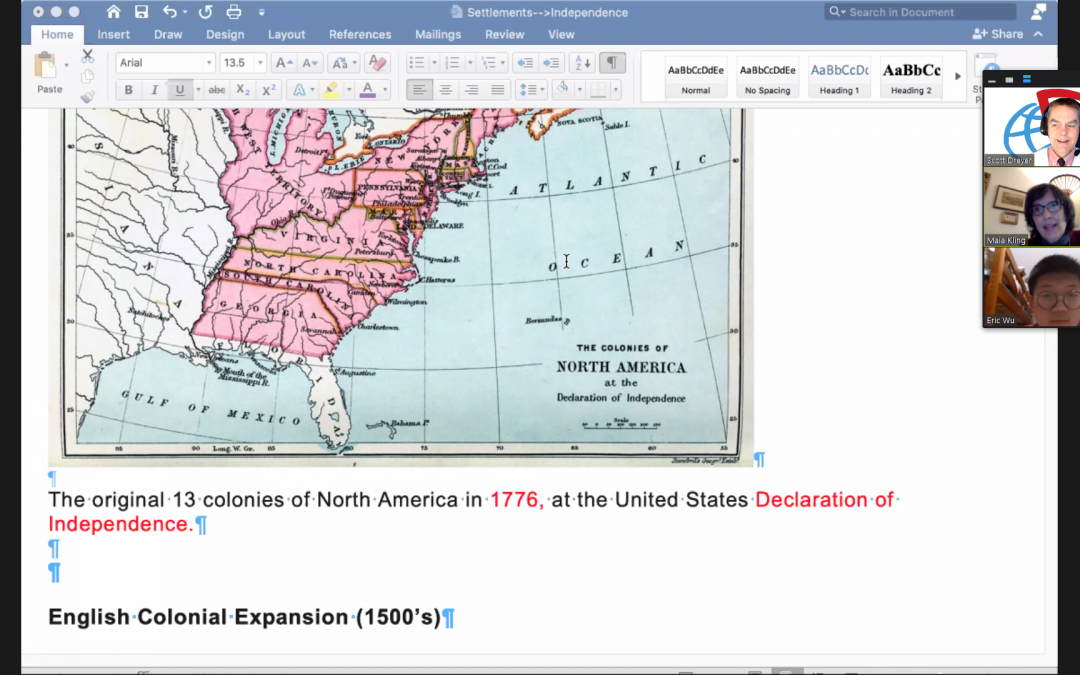Being an optimist, I had hoped to study most or all of the passage during class; however, we only got through the first paragraph!
This passage has SEVERAL layers of difficulty:
1. Second language. DreyerCoaching welcomes everyone, including native speakers of English! However, our focus is to help people learn English as a foreign language. So, when our students in Asia read this passage, it is in a foreign language for them. That is challenge #1.
2.
OLD language. “Old English” was used in England from
about 450 – 1150 AD. Benjamin
Franklin wrote his autobiography from 1771-1790. So, Franklin did not write in “Old English,” but the style is very different from how we speak and write today. Franklin used some different grammar and writing styles. For example, he wrote “refus’d” while today we write “refused.” People in the 1700s also used different words to express themselves than we use today. For instance he wrote “From being thoughtless or indifferent about religion [….]” while today we would write “People did not care about religion.”
That is challenge #2.
3. Unfamiliar history & culture. Not only are many people unfamiliar with English, but they are also unfamiliar with American history. The text says: “Franklin heard Whitefield preach both in the colonies (not the states, at that time) and in England.” What does this mean?
Starting in 1607 at Jamestown, Virginia, settlers from England began to live in North America. Over time, those settlers, colonial companies, and the British monarchs formed 13 colonies on the Atlantic coast of North America. You can see those
13 colonies here. This is why, most of the US and Canada speaks English today, DreyerCoaching teaches English, and why you are reading this blog in the English language and not in Chinese or Russian or Spanish or some other language! (See how history influences the present day!)
In 1776, some American patriots met in Philadelphia, Pennsylvania to discuss and vote to make those 13 colonies an independent country known as the United States of America, which they signed and publicized in the Declaration of Independence–(this is why
the USA birthday is July 4.) Franklin helped both write that document — the Declaration of Independence–and the
US Constitution 11 years later, in 1787. (Please know that DreyerCoaching.com is headquartered in Virginia, so when you study with us, you are getting information from the very birthplace of English-speaking America.) Knowing unfamiliar history:
That is challenge #3.
4.
Unfamiliar religion: Having lived in Taiwan ten years, I know that the Christian religion is not widely practiced and has not deeply impacted the culture there. Being in East Asia, Taiwan has more Buddhism and Chinese folk religions. In contrast, Christianity has been and still is widely believed in the US, and the impact of the Jude0-Christian value system has influenced and continues to influence the dominant lifestyles and culture in the USA, even among people who are not actively practicing Jews or Christians. (To learn more about this fascinating topic, the role of religion in the USA, please
read this blog post.)
This point came to me clearly a few years ago in my
advanced vocabulary/reading class. We were reading a passage from an SAT ® practice book about a “Reverend who worked in a cathedral.” One student, though very bright, had a great vocabulary, and even attended an all-English school, had a problem. She did not know the words “Reverend” or “cathedral.” The way the story was written, those were two key words; if a person did not know those two crucial words, they could never really understand the whole passage. I explained to the student that, since she lived in Taiwan, I could understand how she would not know that vocabulary. It took only a moment to explain both words, and then suddenly the passage made sense to her. That showed me the importance of understanding religious vocabulary and ideas, and what a challenge that was for people from areas with little to no Judeo-Christian background.
This is challenge #4.
Can you see? If a person does not understand the Judeo-Christian worldview and its history and the associated vocabulary, one has almost no chance of understanding this single paragraph.
At
DreyerCoaching, we do not teach the English language only, but also about life, culture and history in America. This is something that makes us unique!


